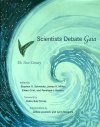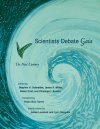Out of Print
By: Stephen H Schneider(Editor), James R Miller(Editor), Eileen Crist(Editor), Penelope J Boston(Editor), Pedro Ruiz Torres(Foreword By), James Lovelock(Introduction By), Lynn Margulis(Introduction By)
377 pages, Illus
![Scientists Debate Gaia Scientists Debate Gaia]()
Click to have a closer look
About this book
Biography
Related titles
About this book
A multidisciplinary reexamination of the Gaia hypothesis, which was introduced by James Lovelock and Lynn Margulis in the early 1970s. The Gaia hypothesis holds that Earth's physical and biological processes are linked to form a complex, self-regulating system and that life has affected this system over time. Until a few decades ago, most of the earth sciences viewed the planet through disciplinary lenses: biology, chemistry, geology, atmospheric and ocean studies. The Gaia hypothesis, on the other hand, takes a very broad interdisciplinary approach. Its most controversial aspect suggests that life actively participates in shaping the physical and chemical environment on which it depends in a way that optimizes the conditions for life. Despite initial dismissal of the Gaian approach as New Age philosophy, it has today been incorporated into mainstream interdisciplinary scientific theory, as seen in its strong influence on the field of Earth System Science. The book provides a fascinating, multi-faceted examination of Gaia as science and addresses significant criticism of, and changes in, the hypothesis since its introduction.
In the book, 53 contributors explore the scientific, philosophical, and theoretical foundations of Gaia. They address such topics as the compatibility of natural selection and Gaian processes, Gaia and the "thermodynamics of life", the role of computer models in Gaian science (from James Lovelock's famous but controversial "Daisyworld" to more sophisticated models that use the techniques of artificial life), pre-Socratic precedents for the idea of a "Living Earth", and the climate of the Amazon Basin as a Gaian system.
Customer Reviews
Biography
James R. Miller is Professor of Earth System Science in the Department of Marine and Coastal Studies at Rutgers University.
Out of Print
By: Stephen H Schneider(Editor), James R Miller(Editor), Eileen Crist(Editor), Penelope J Boston(Editor), Pedro Ruiz Torres(Foreword By), James Lovelock(Introduction By), Lynn Margulis(Introduction By)
377 pages, Illus
As Lovelock neatly argues in his own essay, even in her finery Gaia was never any more fanciful than her archfoe, the selfish gene. This volume amply shows how she has earned her place in conventional science. Fred Pearce New Scientist




































